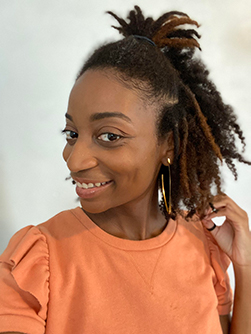Let's Talk About Hair: Seborrheic Dermatitis Relief
It is very important to recognize the skin journey you have been on to put pieces of your personal puzzle together and notice patterns of your worst times dealing with eczema. There are often triggers that are stress-related or simply uninformed decisions at the time. Now that you've read the backstory of how I developed seborrheic dermatitis as a teenager, let's get to the details of healing the problem.
Seborrheic dermatitis is a fungus
Simply put, seborrheic dermatitis is a fungus. Unlike atopic dermatitis and other forms of eczema, it needs to be killed directly with anti-fungal and bacteria-based solutions. Then the scalp needs to be balanced back to normal once the fungus is killed. After researching countless skin conditions and realizing that scalp eczema had to be handled in an opposite manner than what I was used to, I realized that seborrheic dermatitis is very similar to psoriasis.
Cradle cap and candida overgrowth
An alarming idea, I know. Seborrheic dermatitis is also the adult version of cradle cap and can potentially be managed like a candida overgrowth within. Before you research candida, do not go overboard down that hole like I initially did. There are simply certain similarities that you can learn from killing a fungus, which can directly assist your scalp overgrowth issue.
Products I used to kill seborrheic dermatitis
Having this new knowledge of my skin, I experimented with natural products and the prescribed steroid shampoo, which allowed me to gradually stop using that steroid red gel shampoo quicker. I found these items below to be the most beneficial.
Lavender or peppermint castile soap as shampoo
I use Dr. Bronners because it's easily accessible and recommended by most people who shared their journey with seborrheic dermatitis or simple dandruff. Along with the lavender or peppermint, the tea tree is another strong essential oil with bacterial killing properties. These items are staples in my scalp and skin routine. Using this routinely has fully aided in maintaining my scalp health for 3-years now.
Neem oil
This is a medicinal oil that contains anti-fungal and antibacterial properties used solely for healing. Using a cotton ball, place neem oil on the scalp and leave for 20 minutes. Wash out with scalp healing shampoo (the more natural with anti-fungal properties, the better). I also use as a bonus a "clean-beauty" brand shampoo that has Neem and Burdock root as the main ingredient. Neem smells bad, but getting it in its purest form and applying it directly will do the best job when dealing with seborrheic dermatitis.
Apple cider vinegar and water rinse
Approximately 1/4 cup worth of apple cider vinegar "with the mother" and at least 3/4 cup water poured directly on your scalp or through a spray bottle. Do this every time after shampooing. This is most useful for balancing your pH, our acid-base balance for our bodies to function properly. I did not always rinse out after applying, but many suggest doing so. If you have an inflamed scalp or cuts, it will sting at first application but calms shortly after. Rinse out with cold water. Fun Fact: ACV rinse is also good for hair strands and is often used as a natural conditioner.
Caprylic acid
This is the scientific name for coconut oil. There's more to this name, but it is in the majority of products worldwide if you're an ingredient reader. Surprisingly, coconut oil is antibacterial and yeast fighting, which is useful knowledge when understanding the ultimate reality that seborrheic dermatitis is a fungus. I was never a fan of coconut oil until realizing that I had to switch up my entire atopic dermatitis routine based on moisture retention to moisture deficit in the scalp and even the skin problems that I was having at the same time.
I believe that switching to coconut oil in my scalp and body at the time saved me from developing bacteria on my open skin while healing in 2018. Now that my scalp is balanced, I no longer use coconut oil because it will cause buildup. If using any oil at all, which is not often necessary because our natural sebum is enough, jojoba oil is the perfect oil for me when all things are in balance because it is the closest oil to our sebum.
Bonus: Burdock root and ashwagandha
Medicinal herbs that I took as a tea routinely during this time. Amazing anti-inflammatory and medicinal aids, but it takes a while to know if getting positive results.
Trusting the healing process

Our skin in its inflamed and diseased state is equivalent to babies' sensitive skin. Babies are well known to be sensitive creatures, and we care about what goes on their bodies more than anything. We have to be just as cautious and caring of ourselves when dealing with this very overwhelming ailment. Thankfully, because seborrheic dermatitis is like a baby's cradles cap, we often see that babies can heal rather quickly when the right products and natural medicinal properties are used for true healing and prevention. When the skin is peeling and flaky, it is a sign of healing rather than the red, inflamed state. The flaking can worsen before it gets better, but the itching and irritation should calm down first as the fungus is being killed.
I went as far as shaving all of my hair off to allow my scalp to breathe and start fresh back in 2018 when I was going through my worst eczema flare ever. Take some pointers from this article and stay medically informed so that you will not have to go through such extremes. Share in the comments your healing journey with scalp eczema or dandruff. Have you used any of the suggestions given?

Join the conversation